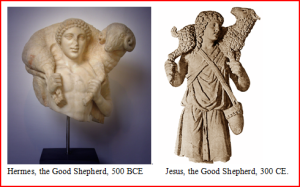
 |
Freethought & Rationalism ArchiveThe archives are read only. |
|
|||||||
|
|
Thread Tools | Search this Thread |
|
|
#1 |
|
Veteran Member
Join Date: Aug 2004
Location: Orlando
Posts: 2,014
|
 Here's a blog where I suggest that the Birth of Jesus narrative in Luke and Matthew might have developed out of a Birth of Hermes narrative. I give ten parallels: 1)Extreme similarity of mothers’ names, 2)Impregnation by highest deity, 3) Birth in a cave, 4) Association with cattle feeding, 5) Crib Transformation, 6) Repeated mention of swaddling clothes, 7) An omen backs up a pronouncement, 8) distinguished visitors bring gifts, 9) Sacrifice of exactly two living creatures. 10) Shepherds and Gods. Are these parallels unique enough to suggest a real connection? Warmly, Jay Raskin |
|
|
|
|
#2 | ||
|
Contributor
Join Date: Jun 2000
Location: Los Angeles area
Posts: 40,549
|
Quote:
We may see Christianity as the egotistical transvaluation of ancient Greco-Roman mythology into Jewish monotheismI can see the transvaluation, but why egotistical, as opposed to communal? Quote:
I'm not sure that swaddling clothes can count - every baby wears some sort of clothes. The distinguished visitors with gifts are not very close (Horae vs Persian magi, flowers vs gold). The omen/pronouncement comparison seems strained, and occurs at different places in the narrative. It's an intriguing set of parallels at the very least, especially considering the lack of such parallels involving the birth scene in the Hebrew scriptures. |
||
|
|
|
|
#3 |
|
Veteran Member
Join Date: Jun 2010
Location: seattle, wa
Posts: 9,337
|
Isn't Paul mistaken for Hernes somewhere?
|
|
|
|
|
#4 |
|
Contributor
Join Date: Jun 2000
Location: Los Angeles area
Posts: 40,549
|
Acts 14
8 In Lystra there sat a man who was lame. He had been that way from birth and had never walked. 9 He listened to Paul as he was speaking. Paul looked directly at him, saw that he had faith to be healed 10 and called out, “Stand up on your feet!” At that, the man jumped up and began to walk. 11 When the crowd saw what Paul had done, they shouted in the Lycaonian language, “The gods have come down to us in human form!” 12 Barnabas they called Zeus, and Paul they called Hermes because he was the chief speaker. 13 The priest of Zeus, whose temple was just outside the city, brought bulls and wreaths to the city gates because he and the crowd wanted to offer sacrifices to them. 14 But when the apostles Barnabas and Paul heard of this, they tore their clothes and rushed out into the crowd, shouting: 15 “Friends, why are you doing this? We too are only human, like you. We are bringing you good news, telling you to turn from these worthless things to the living God, who made the heavens and the earth and the sea and everything in them. ... |
|
|
|
|
#5 | |||
|
Veteran Member
Join Date: Aug 2004
Location: Orlando
Posts: 2,014
|
Hi Toto,
Thanks for the feedback. In his chapter on "The Dream as Wish Fulfillment," in Interpretation of Dreams, Freud says,"It may be observed how conveniently the dream is capable of arranging matters. Since the fulfilment of a wish is its only purpose, it may be perfectly egoistic." It seemed to me "egoistical" or "egotistical" to take narratives from another culture's mythology and use it to support your own cultures' mythology. It is a way of discrediting the other culture and accrediting your culture with their productions. It shows a lack of caring about the feelings of the other culture. Probably all cultures do this to some degree. I would agree that it is certainly a communal action as well. Good point about the lack of such birth narratives in Hebrew scriptures. I think point 10 about shepherds may also be a unique parallel. One would expect priests, fishermen or handicapped (blind,deaf, possessed, etc) men to be included in a birth narrative about Jesus' life. Shepherds are out of place. He is not a shepherd and he does not meet any shepherds in the rest of the gospels. The half dozen or so sayings or parables mentioning shepherds and sheep do not seem an organic part of the story. They are just wisdom sayings that anybody could use to show a bit of cleverness. Warmly, Jay Raskin Quote:
|
|||
|
|
|
|
#6 | |
|
Senior Member
Join Date: Apr 2011
Location: Bronx, NY
Posts: 945
|
Very interesting stuff. I wonder if there are similar possibilities for the Passion.
Quote:
|
|
|
|
| Thread Tools | Search this Thread |
|